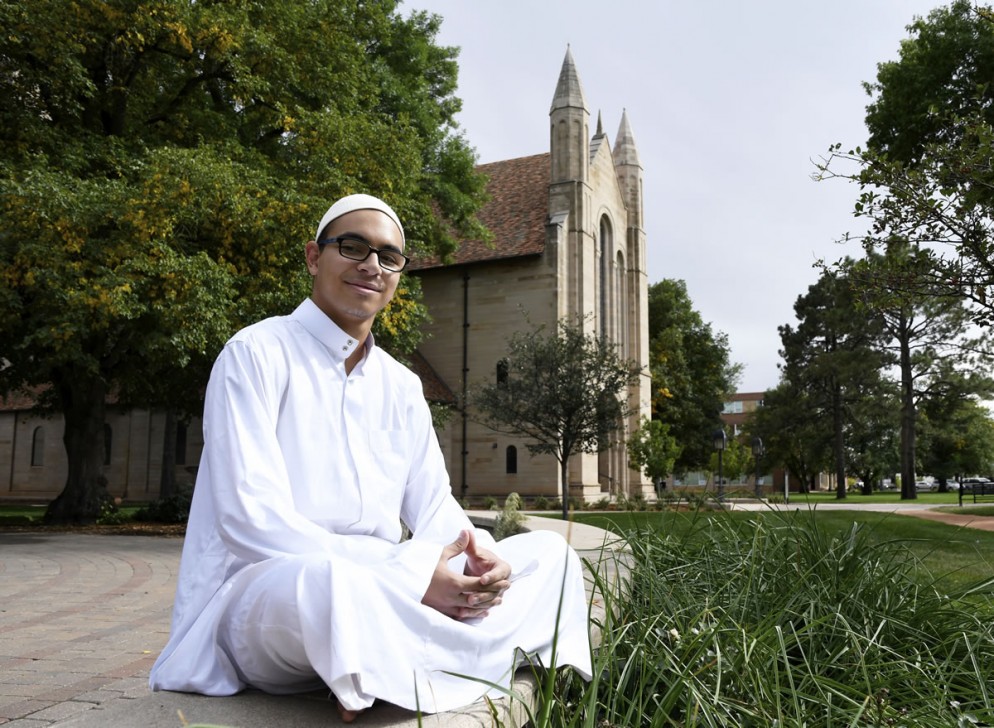My name is Mostafa Zaki-Taha, and I am currently a junior. I hail from distant Egypt, where I have been brought up by a religious Sunni Muslim family that is orthodox in both practice and outlook — everything from what we eat to how we dress and who we date (we didn’t).
Before my arrival at CC, I had never visited the U.S. I had learned of the college through a U.S. Embassy program that introduces Middle Eastern students to American universities. When I first came to campus, I was in complete culture shock. The conservative vibe that had surrounded me in my country was gone, and I suddenly became exposed to all these new things that were considered taboo in both my religion and culture. I had also been brought up as one of the “Ashraf” or “Sayidds” (direct blood descendants of the Prophet Mohammed), which made Islamic education and Islamic history a staple of my upbringing. This made my move to CC, a liberal bubble in a conservative town, all the more challenging.
When I first arrived, there was one distinct thing I noticed, or lack thereof: The call to prayer, which acted as both a reminder of the larger Muslim community around me and a tool for always remembering the grace of God, were nowhere to be heard. At home, I was used to praying five times a day.
I could also immediately see that I was quite different from the people who I was to live and study with for the next four years. The first day I settled into Loomis Hall there was a large party for the freshmen, one where the social taboos that were observed back home were largely absent. One of the resident advisors invited me in, but not knowing how to act or conduct myself in such a setting just made me feel even more out of place. I started searching for a community to which I could belong, one that practices as I practice to make the transition less difficult.
Sadly, the number of openly practicing Muslims was scarce at best. To add to the difficulties, the ailing “Muslim Life” organization at CC provided little solace as it was plagued by neglect and indifference due to that scarcity. There also happened to be only one masjid (mosque) in Colorado Springs, located far away from campus for those of us who did not possess cars. The few Muslim students who did exist on campus rarely showed any sign of practice or outward religiosity. Soon enough I began to understand why. There is a large anti-Muslim bias in some parts in the U.S., touted by politicians such as Donald Trump and others like him. This translates into prejudice and discrimination against Muslims, whether for their belief or their appearance.
This particular trend showed itself when I first arrived in the U.S. at the airport, where I was separated from those on the same plane as me for “random checking,” which was not all that random considering I was the only Arab on the plane and the only one who was stopped. The fear mongering that had been going on in the U.S. media soon enough affected me as it did my colleagues. I began to change the traditional clothing I wore back home to more American dress, and I stopped mentioning that I am Muslim when off CC grounds.
The summer between my freshman and sophomore year, I returned home for a visit. My father had a serious conversation with me about not returning to the U.S., fearing backlash against Muslims such as myself if Donald Trump were to win. I chose to return, and I and another Muslim student decided to create the Muslim Student Association at CC, which would be used as a forum for Muslims to meet out of the public eye and allow self-expression in a community setting where we would feel safe to practice. The club would address Muslim concerns on campus while still being protected by the CC umbrella. It would also serve as a tool to spread awareness about Islam and combat the stereotypes that some impose on us and that would ultimately put us in danger.
Now in our second year, our club has applied for chartership, which will allow it to grow, utilize more campus resources, and access funds through student government. With the MSA, CC has felt a lot more like home, combining aspects of the traditional ways I would practice with all the perks and privileges of being at a small liberal arts school.
